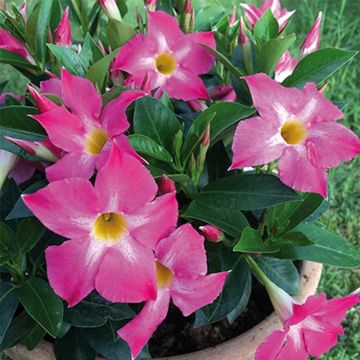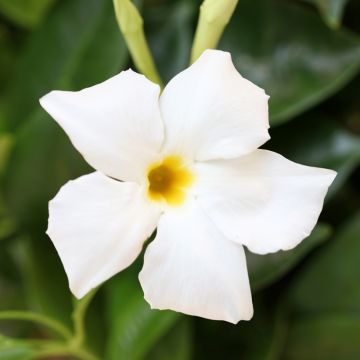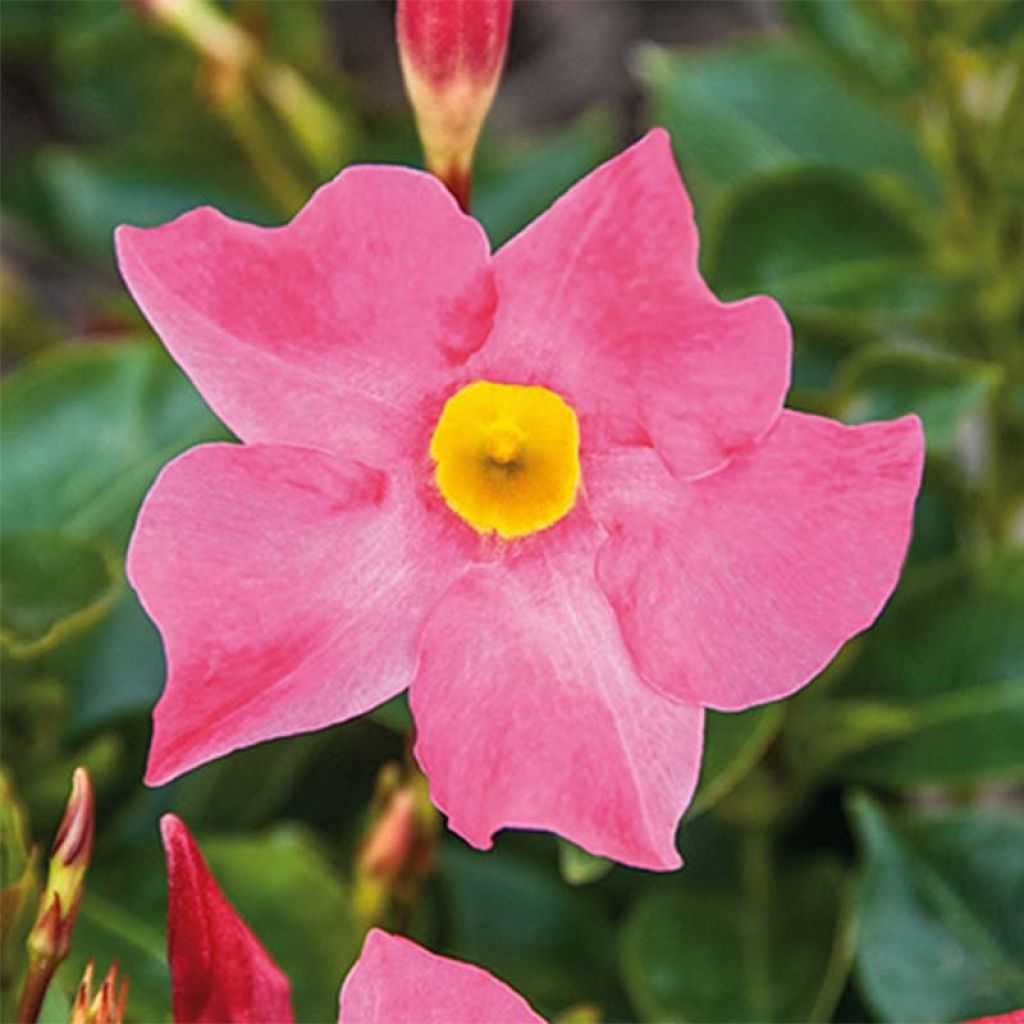

Dipladenia x hybrida Bella Pink
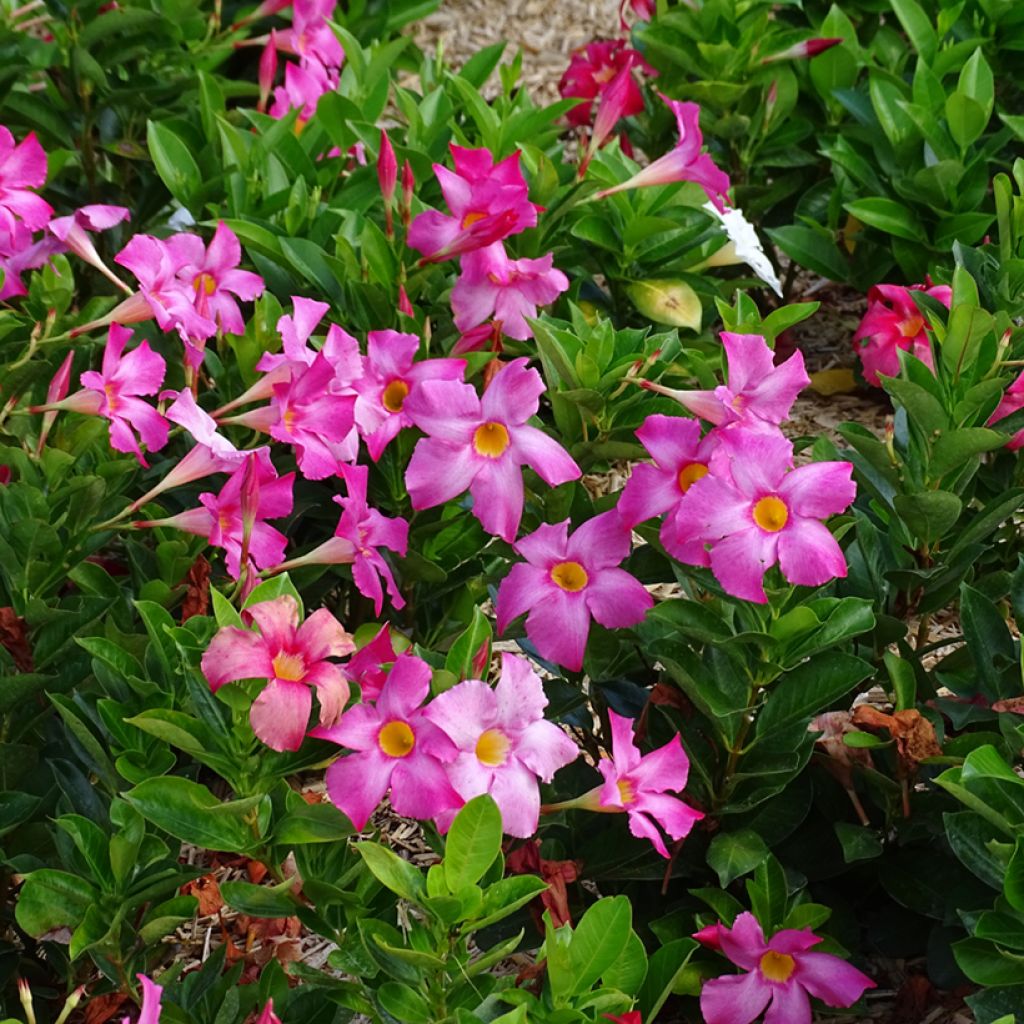

Dipladenia x hybrida Bella Pink
Dipladenia x hybrida Bella Pink
Dipladenia x hybrida BELLA Pink
Suitable for planting, even in full sun.
Francois D., 20/10/2020
Special offer!
Receive a €20 voucher for any order over €90 (excluding delivery costs, credit notes, and plastic-free options)!
1- Add your favorite plants to your cart.
2- Once you have reached €90, confirm your order (you can even choose the delivery date!).
3- As soon as your order is shipped, you will receive an email containing your voucher code, valid for 3 months (90 days).
Your voucher is unique and can only be used once, for any order with a minimum value of €20, excluding delivery costs.
Can be combined with other current offers, non-divisible and non-refundable.
This plant carries a 6 months recovery warranty
More information
We guarantee the quality of our plants for a full growing cycle, and will replace at our expense any plant that fails to recover under normal climatic and planting conditions.

Would this plant suit my garden?
Set up your Plantfit profile →
Description
Dipladenia or Mandevilla Bella Pink is a wonderful little climber that blooms for months without requiring much maintenance. Its large star-shaped flowers in pink with a yellow centre bloom continuously on beautiful dark green foliage from June until the first frost. The Bella series of dipladenias are generous but sensitive, and must spend winter in a bright veranda or a lightly heated greenhouse. These climbers have such presence that they can easily decorate patios and balconies without any other plants.
Mandevilla, named in honour of diplomat and gardener Henry Mandeville, are fast-growing climbing plants, mostly native to the tropical forests of Serra de Orgaos, near Rio de Janeiro, Brazil. Growing at high altitudes, these plants thrive in temperate climates, free from frost, in partial shade or filtered light in summer. They belong to the Apocynaceae family, just like periwinkles and oleanders. In the 1970s, Robert Lannes, a French horticulturist based in Tarn et Garonne, was the first to be interested in hybridising these plants with immense potential, among which Mandevilla sanderi stands out. Years of research and selection have resulted in particularly floriferous, more compact varieties with various colours. They are easy to grow by amateur gardeners.
The Bella series, derived in part from Mandevilla sanderi, produces resistant plants with a compact habit, distinguished by a range of very vibrant colours. The faded flowers are easily removed. These plants are ideal for pots.
Bella Pink develops voluble, woody stems at the base, measuring up to 1.5m (5ft) in length. The plant will climb or spread on the ground, and can even cascade from large pots if no support is provided for its stems. Its growth rate is fast. Its beautiful flowers are composed of 5 large slightly pointed lobes that overlap like the blades of a propeller. Grouped in small clusters, they bloom continuously from May to the first frost. The evergreen foliage consists of entire, dark green leaves arranged in an opposite manner. The thick and leathery lamina, oval to elliptical in shape, measures 5 to 6cm (2in) long and has a shiny upper surface. This plant has large tuberous roots that contain starch and water, helping the plant to withstand drought fairly well.
Mandevilla is often used for decorating pergolas and trellises on patios and balconies, alone or in a mix of colours. This heat-resistant and water-efficient variety will prefer to be planted in a large flower pot placed in isolation on a sunny patio or balcony. It can be paired, for example, with the Bella White variety and Euphorbia 'Diamond Frost'. Cultivation in open ground, in lightened soil, is reserved for regions spared from frost.
Report an error about the product description
Dipladenia x hybrida Bella Pink in pictures
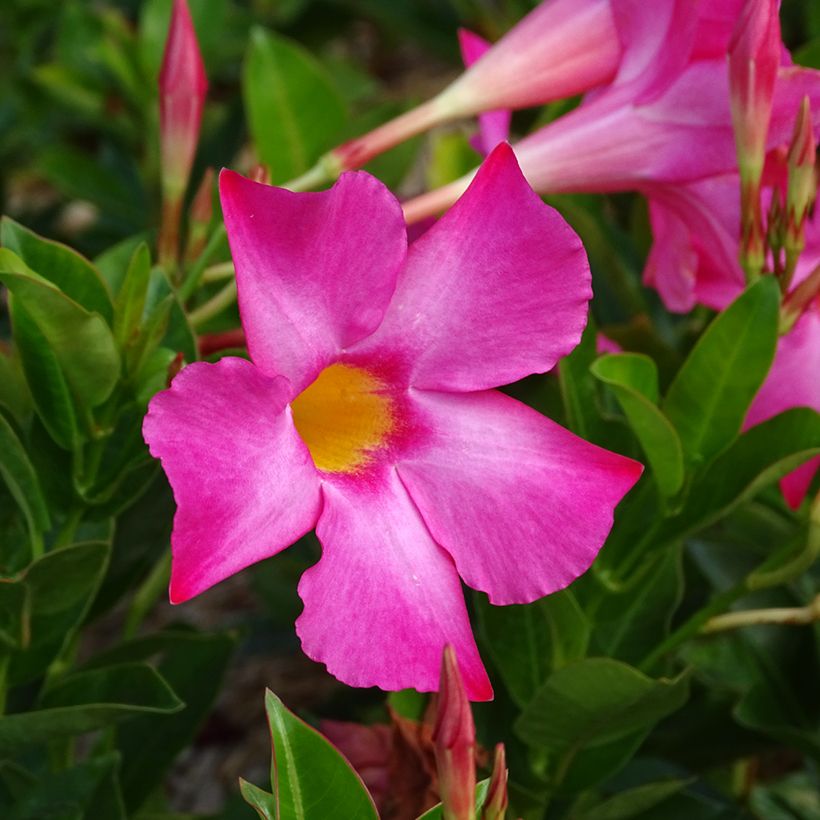

Plant habit
Flowering
Foliage
Botanical data
Dipladenia
x hybrida
BELLA Pink
Apocynaceae
Cultivar or hybrid
Other Dipladenia or Mandevilla
View all →Planting and care
Cultivation in open ground throughout the year is only possible in regions completely unaffected by frost.
Plant in open ground after the last frosts. Provide a support (tripod, stakes) for the voluble stems to wrap around. The ideal location is a sunny spot with some shade during the hottest part of the day in summer. Plant them in soil enriched with compost and coarse sand. You can also plant them in pots placed in a protected area, which you can bring out during the warmer days. Dipladenia plants require well-drained soil that is somewhat dry, but not necessarily very rich to avoid favouring foliage production over flowering. Water moderately. In pots, regular watering is necessary during summer, as well as a supply of flowering plant fertiliser. Let the soil dry between waterings.
During winter, bring the potted plants indoors to a veranda or cold greenhouse. They do not tolerate temperatures below 5°C (23°F).
Planting period
Intended location
Care
-
, onOrder confirmed
Reply from on Promesse de fleurs
Haven't found what you were looking for?
Hardiness is the lowest winter temperature a plant can endure without suffering serious damage or even dying. However, hardiness is affected by location (a sheltered area, such as a patio), protection (winter cover) and soil type (hardiness is improved by well-drained soil).

Photo Sharing Terms & Conditions
In order to encourage gardeners to interact and share their experiences, Promesse de fleurs offers various media enabling content to be uploaded onto its Site - in particular via the ‘Photo sharing’ module.
The User agrees to refrain from:
- Posting any content that is illegal, prejudicial, insulting, racist, inciteful to hatred, revisionist, contrary to public decency, that infringes on privacy or on the privacy rights of third parties, in particular the publicity rights of persons and goods, intellectual property rights, or the right to privacy.
- Submitting content on behalf of a third party;
- Impersonate the identity of a third party and/or publish any personal information about a third party;
In general, the User undertakes to refrain from any unethical behaviour.
All Content (in particular text, comments, files, images, photos, videos, creative works, etc.), which may be subject to property or intellectual property rights, image or other private rights, shall remain the property of the User, subject to the limited rights granted by the terms of the licence granted by Promesse de fleurs as stated below. Users are at liberty to publish or not to publish such Content on the Site, notably via the ‘Photo Sharing’ facility, and accept that this Content shall be made public and freely accessible, notably on the Internet.
Users further acknowledge, undertake to have ,and guarantee that they hold all necessary rights and permissions to publish such material on the Site, in particular with regard to the legislation in force pertaining to any privacy, property, intellectual property, image, or contractual rights, or rights of any other nature. By publishing such Content on the Site, Users acknowledge accepting full liability as publishers of the Content within the meaning of the law, and grant Promesse de fleurs, free of charge, an inclusive, worldwide licence for the said Content for the entire duration of its publication, including all reproduction, representation, up/downloading, displaying, performing, transmission, and storage rights.
Users also grant permission for their name to be linked to the Content and accept that this link may not always be made available.
By engaging in posting material, Users consent to their Content becoming automatically accessible on the Internet, in particular on other sites and/or blogs and/or web pages of the Promesse de fleurs site, including in particular social pages and the Promesse de fleurs catalogue.
Users may secure the removal of entrusted content free of charge by issuing a simple request via our contact form.
The flowering period indicated on our website applies to countries and regions located in USDA zone 8 (France, the United Kingdom, Ireland, the Netherlands, etc.)
It will vary according to where you live:
- In zones 9 to 10 (Italy, Spain, Greece, etc.), flowering will occur about 2 to 4 weeks earlier.
- In zones 6 to 7 (Germany, Poland, Slovenia, and lower mountainous regions), flowering will be delayed by 2 to 3 weeks.
- In zone 5 (Central Europe, Scandinavia), blooming will be delayed by 3 to 5 weeks.
In temperate climates, pruning of spring-flowering shrubs (forsythia, spireas, etc.) should be done just after flowering.
Pruning of summer-flowering shrubs (Indian Lilac, Perovskia, etc.) can be done in winter or spring.
In cold regions as well as with frost-sensitive plants, avoid pruning too early when severe frosts may still occur.
The planting period indicated on our website applies to countries and regions located in USDA zone 8 (France, United Kingdom, Ireland, Netherlands).
It will vary according to where you live:
- In Mediterranean zones (Marseille, Madrid, Milan, etc.), autumn and winter are the best planting periods.
- In continental zones (Strasbourg, Munich, Vienna, etc.), delay planting by 2 to 3 weeks in spring and bring it forward by 2 to 4 weeks in autumn.
- In mountainous regions (the Alps, Pyrenees, Carpathians, etc.), it is best to plant in late spring (May-June) or late summer (August-September).
The harvesting period indicated on our website applies to countries and regions in USDA zone 8 (France, England, Ireland, the Netherlands).
In colder areas (Scandinavia, Poland, Austria...) fruit and vegetable harvests are likely to be delayed by 3-4 weeks.
In warmer areas (Italy, Spain, Greece, etc.), harvesting will probably take place earlier, depending on weather conditions.
The sowing periods indicated on our website apply to countries and regions within USDA Zone 8 (France, UK, Ireland, Netherlands).
In colder areas (Scandinavia, Poland, Austria...), delay any outdoor sowing by 3-4 weeks, or sow under glass.
In warmer climes (Italy, Spain, Greece, etc.), bring outdoor sowing forward by a few weeks.






























